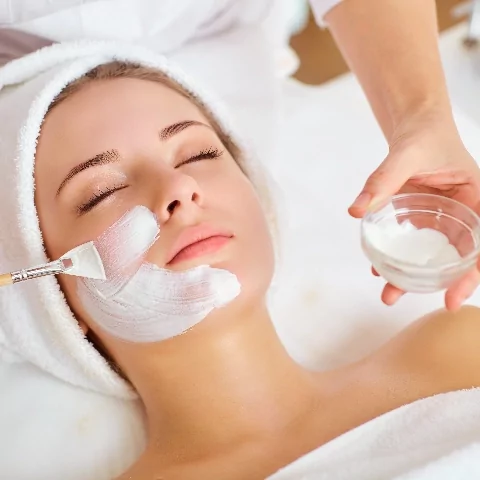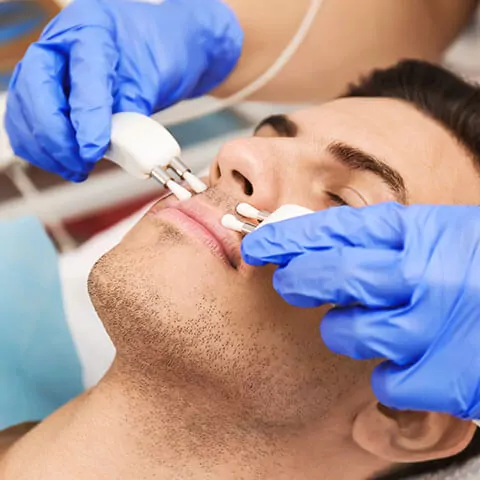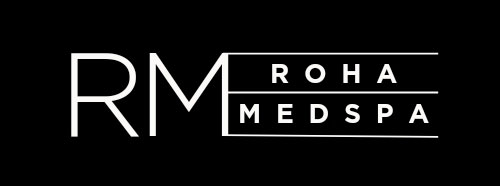Dental Hygiene
Dental Hygiene
Discover the secret to a self-assured, beautiful smile with the help of our dental hygiene services. Your go-to resource for obtaining the smile of your dreams and the best possible oral health is Roha Medical Spa. We provide a holistic approach to your oral health, not just routine cleanings. Start Your Smile Transformation now.
SERVICES
What is Dental Hygiene and How It Works?
Preventive care is the main goal of dental hygiene. By taking a proactive approach to process of clinical care, it serves as your guard against frequent oral health issues. You establish a strong foundation for long-term oral health promotion by keeping up with routine dentist treatments. During these examinations, your teeth and gums’ general health will also be evaluated in addition to being cleaned.
Book An Appointment
Here's a breakdown of how Dental Hygiene Ontario works
- Professional Cleaning
Visiting a dentist or dental hygienist at dental clinic is the first step in dental clinical practicing dental hygiene. During this appointment, the specialist will clean your teeth using specialized tools to get rid of plaque, tartar, and any stains that may have built up.
- Comprehensive Examination
Part of dental hygiene is a careful assessment of your oral health. Your teeth and gums are examined by the dentist for indications of common problems like cavities, gum disease, and other oral health issues. Effective therapy depends on early discovery.
- Personalized Care
There isn’t a one-size-fits-all strategy for dental hygiene skills. A customized dental care for clients regimen is created for you by our oral health care team. This includes advice on maintaining good oral hygiene at home, such as brushing, flossing, and using mouthwash.
- Prevention of Oral Issues
Dental hygiene appointments on a regular basis aid in the prevention of common oral health issues by removing plaque and tartar, which, if ignored, can result in cavities and gum disease.
- Maintaining a Healthy Smile
Dental hygiene practice prioritizes both oral health and improving the appearance of your teeth. During the cleaning procedure, stains and discolorations are addressed, leaving a smile that is brighter and more visually pleasant.
GET SUPPORT
SUPPORT@rohalaserspa.com
Ready to reveal your best skin? Book a consultation with Roha Medspa today!
Benefits of Dental Hygiene
Your best line of defense against frequent issues with your oral health is good dental hygiene. The likelihood of developing cavities, gum disease, and other dental practice problems can be considerably decreased with regular health professional cleanings and inspections. Dental hygiene maintains the health of your teeth and gums by aggressively removing plaque and tartar.
Maintaining fresh breath is mostly dependent on practicing good oral hygiene. Dental hygiene process leaves your mouth feeling fresh and clean by assisting in the removal of the bacteria that causes bad breath.
Dental hygiene program has aesthetic benefits in addition to health benefits. Stains and discolorations are successfully removed throughout the cleaning procedure, boosting the aesthetic appeal of your smile. Your confidence will increase as a positive health-care outcomes of your teeth appearing whiter and brighter.
Comprehensive oral examinations are part of routine dental hygiene appointments. This is essential for identifying issues early on. Cavities, gum irritation, and worrisome oral lesions can all be quickly found and treated. Less invasive and more economical treatments are frequently associated with early intervention.
Your self-esteem is greatly impacted by having a grin that is both aesthetically pleasing and healthy. Maintaining good dental hygiene experience boosts your self-esteem in addition to your oral health status. You’ll feel more self-assured in social and business situations when you know your smile is in top condition.
Dental hygiene professionals are excellent resources for information about oral health. They can offer advice on effective brushing and flossing techniques, picking the best oral care products, and dietary clinical practices that affect your oral health during your dental hygiene appointments. You are now better equipped to take preventative care of your teeth in between appointments thanks to this instruction.
Dental hygiene may also involve preventive procedures like fluoride treatments and dental sealants, in addition to cleanings. These procedures strengthen and safeguard your teeth even more, lowering the chance of tooth decay and preserving long-term dental health.
Dental hygiene excels in this area because of its focus on Individualized Care. To meet your unique needs for oral health, your dentist will customize your care plan. By doing this, you can be sure that you get the help and guidance that are most appropriate for you.
How Should You Prepare for Your Dental Hygiene Treatment?
Maintain Regular Oral Care
Prior to your dental hygiene visit, continue practicing your regular oral hygiene regimen. This entails flossing once daily and brushing your teeth at least twice a day. Taking good care of your teeth lowers the quantity of plaque and tartar that needs to be removed during a professional cleaning, which speeds up the procedure.
Note Any Concerns
Make a note of any concerns you may have: Write down any particular dental problems or concerns you would like to discuss with your dentist. These may involve inquiries concerning gum health, dental sensitivity, or aesthetic issues. Asking thoughtful inquiries can guarantee that you get the help you require.
Update Your Medical History
Let your dentist and dental assistant know if your health or prescriptions have changed since your last visit. Your oral health may be impacted by changes in your medical state, so your dentist needs to know about these changes in order to treat you safely and effectively.
Arrive On Time
It’s critical to arrive on time for your appointment. This enables your dentist to devote enough time to your treatment and answer any queries or concerns you may have.
Relax
Dental hygiene appointments are frequently simple and painless. Never be afraid to talk to your dental professional if you are worried about your appointment. To make your visit more comfortable, they can offer direction and comfort.
Follow Any Additional Instructions
Depending on your particular needs or the nature of your treatment, your dental health care professionals may give you additional instructions that you must follow. Pay attention to any instructions they give you on fasting or other preparations.
How Should You Care for Your Smile After Dental Hygiene Treatment?
Continue Daily Oral Care
It’s important to maintain consistency in your daily dental care routine. Use fluoride toothpaste to brush your teeth at least twice a day. Consider using the right brushing methods to get all of your teeth clean. Additionally, remember to floss every day to get rid of plaque and food bits stuck in between your teeth.
Rinse with Mouthwash
As advised by your dentist, use a mouthwash that contains fluoride or antimicrobials. This might strengthen your teeth and aid to minimize bacteria. Make sure you adhere to the directions provided on the product label.
Stay Hydrated
Drinking plenty of water is beneficial for both your dental and general health. It lessens the chance of plaque accumulation by removing bacteria and food particles.
Avoid Staining Substances
To keep your smile bright, try to restrict or stay away from things that can stain your teeth. Red wine, tea, coffee, and tobacco goods fall within this category. If you do eat these things, you might want to rinse your mouth or brush your teeth afterwards.
Attend Follow-Up Appointments
A dentist could advise you to attend follow-up appointments for further cleanings or particular treatments. Making these visits is essential to maintaining your oral health. Make sure to arrange and show up as instructed.
Follow Professional Advice
Depending on your oral health program requirements, your dentist may offer particular advise. This can involve suggestions for unique dental hygiene care products, dietary modifications, or way of life improvements. Following these recommendations will support maintaining the health of your smile.
Be Mindful of Sensitivity
Following dental hygiene therapy, some real clients may suffer mild tooth sensitivity or gum irritation. Usually, this soreness passes quickly. Consider using toothpaste designed for sensitive teeth if you have sensitivity, and brush gently.
Monitor Your Oral Health
Keep an eye out for any changes or problems with your dental health. For guidance and an assessment, get in touch with your dentist if you detect anything strange, such as bleeding gums, persistent bad breath, or pain.
GET SUPPORT
SUPPORT@rohalaserspa.com
Maintain Your Radiant Skin – Contact us now and Book Your Next Appointment!
FAQs
It is normally advised to schedule dental hygiene appointments every six months. This is a general recommendation to ensure the best possible oral health. It’s crucial to remember that the perfect schedule can change based on your unique minimum requirements. Your dentist will evaluate the state of your oral health in particular and, if necessary, suggest an alternative schedule. Scheduling routine dental hygiene appointments is crucial to avoiding dental problems and maintaining the health of your smile.
Dental hygiene procedures are typically not uncomfortable. The majority of patients feel little to nothing uncomfortable while the area is being cleaned. To make the procedure as comfortable as possible, dental experts employ specific equipment and methods. While you could clinical experience some pressure and vibrations while the cleaning is going on, most people can take it. Do not be afraid to communicate your unique discomfort concerns with your dental expert so that they can take steps to improve your comfort.
Although Dental Hygiene side effects are uncommon, some people may experience momentary tooth sensitivity or gum inflammation. Usually, these effects are minor and transient. Dental experts take precautions to reduce the possibility of adverse reactions, like suggesting toothpaste for teeth that are sensitive and employing mild cleaning methods. Make sure you let your dentist know if you do feel uncomfortable or have any negative effects after practicing oral hygiene so they can offer you the right advice and solutions.
Patients of all ages, including youngsters, can benefit from dental hygiene. As a preventive strategy, it’s actually strongly advised for kids to make sure their oral health is preserved from an early age. Dental hygiene for kids usually entails applying fluoride treatments to strengthen growing teeth, teaching them about good oral hygiene habits, and using mild, age-appropriate cleaning techniques.
A full cleaning typically takes 45 to 60 minutes during a dental hygiene treatment, though this can vary. The amount of cleaning that needs to be done and your unique oral health condition could affect how long it takes. You can talk to your dentist about any time restrictions or preferences, and they will make sure that you receive the required care within a fair amount of time.





